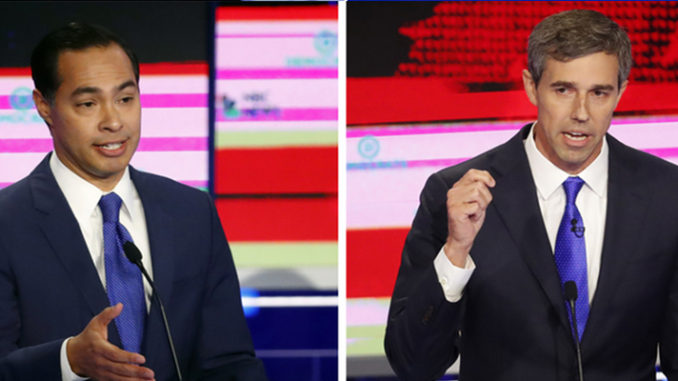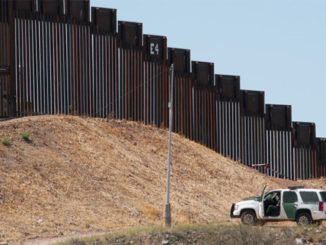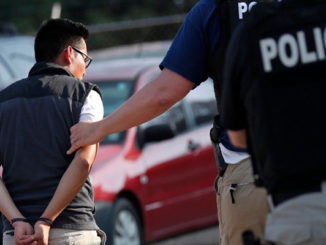
by Carole Callaghan
There has been a lot of recent talk about who’s right, Castro or Beto, with regard to 8 USC §1325. At the debate, Castro went after Beto for refusing to state that the section should be abolished. Since then, several people have argued that abolishing §1325 would result in open borders. Others have said that people are exaggerating Castro’s position, and that he simply wants to decriminalize illegal border crossings but is not in favor of open borders. Following the debates, Castro himself attempted to clarify, arguing that he wants illegal crossing to be a civil offense only. However, the civil offense is also part of §1325, and thus, the section’s repeal would lead to no civil or criminal penalty for crossing the border outside a point of entry.
For the purposes of this discussion though, let’s assume that Castro only wants to repeal §1325(a), which makes it a misdemeanor to either cross the border at a non-designated entry point or lie to/mislead crossing guards at a border crossing (e.g. presenting false papers or passport) and that he wants to keep the remainder of §1325 intact (Note, this is absolutely not what he has ever said, either at the debate, during interviews, or on his website, where he argues to “Repeal section 1325.” But let’s give him the benefit of the doubt and assume that he has simply not been precise in his statements).
How did we get here? Section 1325(a) is the only statute which criminalizes illegal entry into the US (§1326 is its counterpart for illegal re-entry, but it is only used on people who have previously violated §1325, so we’re ignoring that for now). In the recent past, this statute has been used largely to detain and deport non-asylum-seeing illegal immigrants entering the US outside of legal entry points (called “illegal entry”).
Under previous administrations, this statute was not used on asylum seekers, because the asylum statutes (largely found in 8 USC §1225) do not differentiate between entering at a legal point of entry or at any other place along the border. A person seeking asylum in the US is simply required by law to enter the country and immediately turn themselves over to immigration/border patrol by stating that they are seeking asylum. If they do so (at least before Trump), per §1225, they are treated as having lawfully entered the country, regardless of point of entry. At that point, the US must make an initial determination as to whether they have a “credible fear of prosecution” in their home country. If they do, the US is required by §1225 to detain the asylum-seeker until a full determination can be made as to whether they qualify for asylum.
In 1997, the US entered into a settlement agreement in a case involving the extended detention of a minor immigrant. The settlement agreement is now referred to as the “Flores Agreement.” It prevents children from being detained for extended periods of time, except under specific circumstances. Here’s why it’s important: In 2017 the Trump administration began a “zero tolerance” policy, using §1325(a) to arrest and detain asylum seekers who did not legally enter the US at a point of entry, despite the fact that the asylum statute does not require entry at a legal point of entry. He then argued through a warped interpretation of the Flores Agreement that the administration was required to separate children from their parents. However, due to strong bipartisan backlash, on June 20, 2018, Trump issued an executive order limiting the family separation policy. In a further blow to his family separation plan, on June 26, 2018, a court enjoined the practice of family separation and ordered the reunification of almost all families (except in cases where the parent/parents were determined to pose a risk to their children). The administration reunited just over ½ of the families. But the administration claims that over ¼ of the adult family members pose a risk to the children, and they refuse to reunited them. Further, approximately 430 children could not be reunited with their families because the adult family member had been deported without them, and the US was unable to locate an adult family member. Despite the court order, the Trump administration continues the practice of separating families when they deem the adult poses a threat to the minor. It is likely that the administration is intentionally being over-broad in findings of threat, thereby detaining a greater number of minors than they should. While the order curtailed the majority of family separations, currently, several hundred children are still being held separate from their families in horrific detention centers along the border.
So, is Castro correct in calling for a repeal of §1325(a)? Maybe, but it is unlikely to achieve what he hopes. §1325(a) is still being used to detain some asylum seekers and separate children from adults, and it’s repeal would essentially close a loophole in Trump’s ability to rip families apart. But that practices has been largely stopped due to court intervention. Furthermore, Trump would likely find other loopholes for separating families, especially through §1225, which mandates detention during asylum eligibility determinations. Also, for Castro, or any other presidential candidate to repeal §1325(a), they would have to actually be in office, meaning Trump would not be in office, and thus the issue would become moot. Let’s face it, no other president would do what Trump has done, and any democrat (and frankly, any republican running against Trump) would immediately reverse the executive actions that Trump has taken to create this horrific situation. The law has been on the books for almost a century, and nobody has used it like this. Thus, the repeal of §1325(a) would be unlikely to change much with regard to the continued family separation that we are seeing under Trump. It may help in a small number of cases, but it would not be the full solution. That would require comprehensive immigration reform, and frankly, a new congress (fingers crossed). Finally, Trump has come up with a new method of radicalizing our border policies, which he is turning his focus to now. His new “metering” policy allows border agents to accept asylum seekers, process their information, and then send them back across the border to Mexico until it’s essentially “their turn” to be interviewed. That process is currently being used to delay asylum hearings for weeks or longer, and it is thought to be the reason that Oscar Martinez Ramirez and his little girl died attempting to illegally crossed the border. Section 1325 has nothing to do with his new metering policy.
What would actually change if we repealed §1325(a)? The answer (again, if we are only talking about 1325(a)..repealing the full statute would be vastly different), would be: “not much.” It would certainly take away a possible method for Trump to separate families, but that has already been largely done by the courts, and as I mentioned above, we are talking about what will happen starting on January 20, 2021, not what will happen under Trump.
Repealing §1325(a) would decriminalize border crossings and make the act of stepping across the border outside a point of entry a civil offense rather than a criminal one. Illegal immigrants could still be deported, but they couldn’t be criminally charged for illegal entry. Thus, a possible positive effect is that some of the stigma associated with an “illegal” crossing (which I’m using to mean a crossing not occurring at a point of entry) would be gone. It would also reduce the backlog of cases that are currently on the immigration court dockets.
A likely negative effect is that a repeal would take away the deterrent factor that currently exists for illegal crossings at areas other than points of entry. In other words, if you aren’t going to be criminally prosecuted for it, you may be more likely to cross in a dangerous area to avoid being turned around at the border or instead of attempting to gain legal entry. Repeal of §1325(a) would therefore be far more likely to increase illegal crossings. This is evidenced by our history. Before the Bush administration, §1325(a) was almost never enforced, and illegal border crossings were becoming a increasing problem. Once the Bush administration began enforcement, illegal entries dramatically decreased. Alarmingly, an increase in border crossings outside points of entry would likely lead to an increase in accidental deaths such as that of Oscar Martinez Ramirez and his daughter.
Would repealing §1325(a) create an “open border?” No. It would maintain what we have now, which is called a “controlled border.” This means that our government could still stop people at the border and require proof of legal entry. But there would be no criminal controls, thus, the most that could happen is that illegal immigrants are civilly charged and deported. A true open border would be equivalent to what we have now between states where people are allowed to come and go without being stopped at all. However, the lack of any criminalization of illegal border crossings will make it closer to an open border than what we currently have.
Would repealing §1325(a) stop Trump’s family separation tactics? Probably not. While it would decriminalize simple illegal entry, it wouldn’t stop Trump’s ability to separate refugee families or families seeking asylum through other means. Section 1225(B)(iii)(IV) requires detention of an alien seeking asylum pending a final determination of his/her claim of credible fear of persecution. Trump could easily use this statute to create the same inhumane separation practices that he currently uses, claiming that adult family members pose a threat to the child. Further, as mentioned above, Trump has largely moved on from this practice, and is now using “metering” as a deterrent to immigration. Nonetheless, he is continuing to cage some children, and is effectively denying asylum seekers their rights under our laws. And we should all fight to stop his inhumane tactics and return the currently detained children to their families.
What is Beto’s plan to correct this situation if it’s not to repeal §1325(a)? Beto, like all of the candidates currently running, wants to end the practice of separating migrant children from their families. Any president elect will be able to do this by executive action on day one of his or her administration by simply instructing DHS to stop the practice. Beto further believes that rather than wholesale decriminalizing border crossings, a better approach is to close the loopholes Trump is using to torture children and their families. He further proposes creating a more streamlined process for those seeking asylum in the US as well as for those wishing to simply immigrate here for other reasons.
So how are Beto’s and Castro’s policies different? I have read both Castro’s and Beto’s policy proposals, and like virtually all of our candidates, they have far more in common than they do different. The essential difference between their policies is whether border crossings continue to have a criminal element or not. Castro argues for a blanket repeal of any criminalization of illegal border crossings. Beto argues the criminalization should continue to exist, but with protections put in place to limit detention to only those illegally crossing the border who also have a criminal background, and to prohibit family separation. Whether you believe in one policy or the other, both have valid arguments, and both reflect a great deal of thought and research. Essentially, one is a more radical approach (Castro), and one is more nuanced (Beto).
In my opinion Beto’s approach makes more sense for several reasons. First, and most importantly, I believe that decriminalizing illegal crossing will result in more migrant deaths, and I personally believe that we should do everything in our power to prevent such tragedies. By streamlining both the immigration and asylum processes, and by loosening the immigration, visa, and asylum standards, Beto’s proposal takes the fear out of seeking legal entry, and prevents families from attempting illegal and dangerous crossings at non-entry points. Second, I think that comprehensive immigration reform should make immigration easier, while still reflecting that our laws exist to protect our society. Beto’s policy proposal does just that by streamlining processes, making it easier to obtain legal entry, reducing the consequences of criminal penalties, and ensuring that families are never separated at the border absent a genuine risk to a child’s safety. Third, I think that decriminalization could lead to an increase in other types of criminal border crossings. While Castro argues that other laws that would remain in effect would take care of this, I believe that having a criminal element to actual illegal crossings will reduce the amount of drug and human trafficking, both by serving as a deterrent to those wishing to engage in such criminal behavior, and by allowing border agents to have greater flexibility in their efforts to keep our borders secure. Finally, from a pragmatic standpoint, the majority of Americans are not in favor of decriminalizing illegal border crossings. Thus, it is highly unlikely that any legislation attempting to fully repeal §1325(a) would fail, even if we have a democratic majoring in the House and Senate.
I encourage you to research the proposed plans of all candidates and decide for yourself which you most agree with.
Carole Callaghan is a freelance author and an attorney living in Evergreen Colorado.



